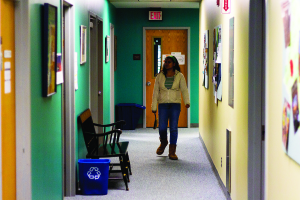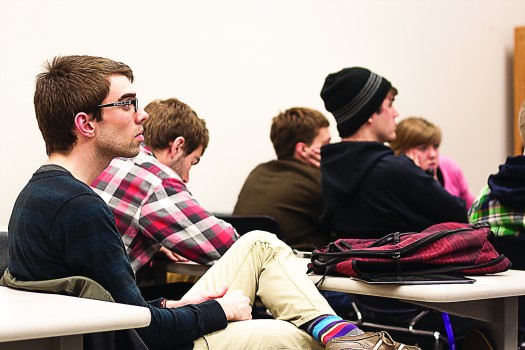For the third year, the chemistry and communication departments will continue their search for new faculty to fill a biochemistry and a web communication and media arts position. There are currently eight open faculty positions departments are attempting to fill this semester, including the biochemistry and web communication and media arts positions.
 Speaking about the biochemistry position, Professor Karen Torraca, department chair of chemistry, said, “It’s really difficult to find someone who has a strong Christian faith coupled with the biochem piece and that wants to teach.” Torraca said it is hard to draw in candidates when there are “much higher salaries in industry.” Similarly, Professor Douglas Gaerte, department chair of communication, said the web communication and media arts position is tough to fill because applicants generally have “all kinds of job opportunities outside of education that potentially could make a whole lot more money.” This semester, the communication department is restarting the search for this new position after college administration asked them to suspend it for a year.
Speaking about the biochemistry position, Professor Karen Torraca, department chair of chemistry, said, “It’s really difficult to find someone who has a strong Christian faith coupled with the biochem piece and that wants to teach.” Torraca said it is hard to draw in candidates when there are “much higher salaries in industry.” Similarly, Professor Douglas Gaerte, department chair of communication, said the web communication and media arts position is tough to fill because applicants generally have “all kinds of job opportunities outside of education that potentially could make a whole lot more money.” This semester, the communication department is restarting the search for this new position after college administration asked them to suspend it for a year.
This is the first year that Professor Kenneth Bates, department chair of business and economics, is trying to fill the two tenure track business positions – a finance position replacing Professor Richard Halberg, who opted for an early retirement package two years ago, and an accounting position to replace Professor Lois Ross, who will be retiring at the end of the year. Bates said, “Many of our candidates fade away real fast when they hear what the salary is.” However, Professor Kristen Camenga, department chair of mathematics and computer science, who is hiring for both applied math and math generalist positions, said lower salaries are “a secondary issue if you have people that have bought into the location and the mission fit” and who understand that the “finances of the area” include relatively low living costs.
In some cases, Houghton’s rural setting can be a disadvantage to faculty hires as a matter of the candidate’s personal preference. For the art department, however, location can be especially challenging. Professor Gary Baxter said, “A lot of artists realize that their best chance of being successful as an artist is to be in an urban setting” because of better access to museums, galleries, and a larger community that will support their work. In other areas, as Gaerte said, “Our location is not consistently a detriment.” Professor Aaron Sullivan, department chair of biology, who is hiring for the genetics position, said Allegany County’s limited job opportunities for the spouses of married candidates could be a concern as “many are unwilling or unable to commit to commuting long distances.”
For some departments, finding a candidate with the appropriate academic qualifications is one of the greatest challenges. As all eight open positions are for tenure track, search committees are seeking candidates with terminal degrees in their fields. Applicants for the web communication and media arts position who have been working professionally “haven’t necessarily been going to school in that time,” said Gaerte, making it challenging to find an applicant with sufficient experience in both industry and academia. Similarly, Bates said among the applicants out of the business world, very few fulfill the terminal degree requirement because “while in academia we see [PhDs] as an asset, in the business world usually those are considered liabilities.” There is some flexibility, however. Bates said the business department could hire someone without a terminal degree, but could put a contingency on hiring that the candidate would work to earn their doctorate by the time they are eligible for tenure.
Candidates are made aware of Houghton’s faith statement and community covenant early in the application process. This creates, as Camenga said, a “self-selection process” such that candidates that do not fit with the Houghton culture have a better chance of “figuring out they don’t fit before they ever come, before there’s the investment.” Sullivan said while this does “limit the pool of candidates,” in his experience, candidates are often “looking for the opportunity to integrate their faith with their discipline.” For Torraca, however, many of the qualified candidates for the biochemistry position, which will replace Professor Irmgard Howard, who retired in 2013, are “either not strong Christians or are more agnostic.” Torraca said finding candidates that are mature in their faith has been crucial component to the biochemistry job search as “ethical implications come up a lot more often than in some other chemistry areas.”
For art candidates, Baxter said, the conservative Christian environment of Houghton “cuts your pool of applicants significantly…in half or maybe even more than that.” Bates, however, said for the business department “within the spectrum of evangelical Christian faith, we’re widely open to different perspectives.”
In the mean time, many departments have hired interim or adjunct professors to keep programs functioning, but filling the tenure track positions would be ideal. Camenga said, “It’s really about providing some stability for the department” whereas short term hires means “you spend your time every year searching.” The Math Generalist position will replace Camenga who is leaving at the end of the academic year, and the applied math position will replace Professor Jun-Koo Park who left at the end of the spring semester. His position has been filled for the year by Brandon Bate, interim assistant professor.
The music department is seeking to fill a music theory and composition position, and the art department hired Alicia Taylor, interim assistant professor, to replace Professor Jillian Sokso during the search for a tenure track professor. For the finance position, Bates said the department has “hired from the outside” on a course-by-course basis but that in the past two years the department has “stopped teaching a few elective courses.” Senior business administration major, Bradley Oliver said while the adjunct professor for finance is “fulfilling the minimum requirements,” there are problems with accessibility as “he is only on campus once a week.”
The chemistry department has been holding out for the ideal candidate who, Torraca said, would be someone “who can really help develop the biochemistry program.” Gaerte said, the web communication and media arts candidate “has to be someone that sees this as their mission…that’s why most of us are here anyway.”

